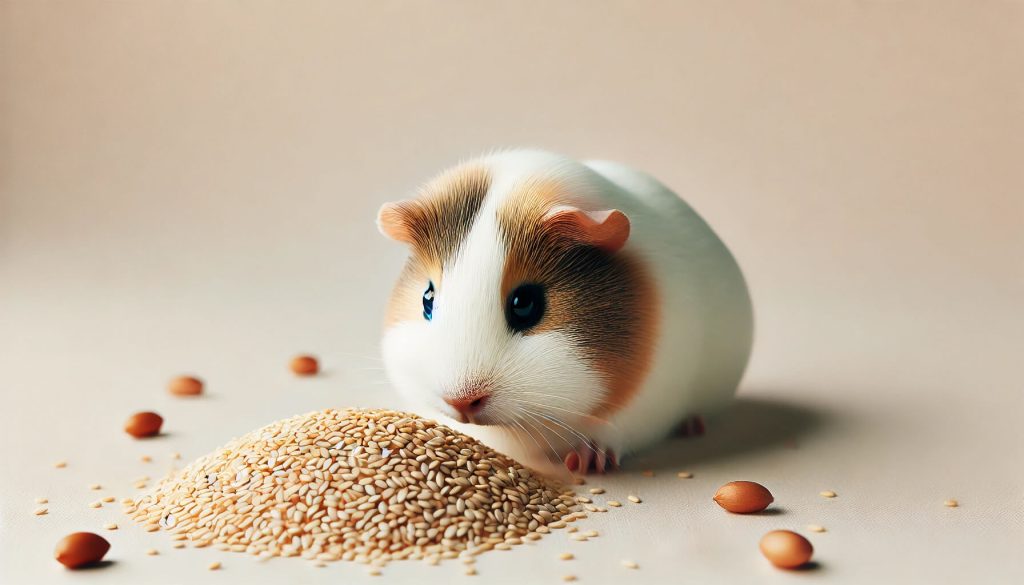
Can Guinea Pigs Eat Sesame Seeds?
Understanding Guinea Pig Dietary Needs
Proper nutrition is essential for maintaining your guinea pig’s health. Knowing what foods meet their dietary requirements can improve their well-being.
Natural Diet of Guinea Pigs
Guinea pigs primarily consume plants. In the wild, they eat grasses, herbs, and leaves. With domesticated guinea pigs, fresh hay, vegetables, and a limited amount of fruits form their ideal diet. Hay, like Timothy or meadow hay, should be available daily since it aids digestion and dental health. Guinea pig pellets formulated with essential vitamins and minerals also support their dietary needs.
Nutritional Requirements
Vitamin C is crucial for guinea pigs because they can’t synthesize it. Provide fresh vegetables high in Vitamin C, like bell peppers, kale, and broccoli. Guinea pigs also benefit from a fiber-rich diet, promoting proper digestion and preventing gastrointestinal issues. Avoid feeding them foods high in sugar, fat, or calcium, which can harm their health over time. Fresh water must be available at all times, preferably in a clean water bottle attached to their cage.
Guinea pigs thrive on specific food items tailored to their dietary needs. Understanding this helps you make informed choices, ensuring a healthy and happy pet.
Evaluating Sesame Seeds
Considering adding sesame seeds to your guinea pig’s diet requires careful evaluation. Understanding their nutritional content and potential health benefits helps make an informed decision.
Nutritional Content of Sesame Seeds
Sesame seeds contain high levels of fat and calories, which can lead to obesity in guinea pigs if consumed frequently. They’re also rich in protein, fiber, and essential minerals like calcium, phosphorus, and magnesium. However, guinea pigs thrive on diets low in these elements. Too much calcium from sesame seeds can cause urinary issues, including bladder stones.
Potential Health Benefits
While sesame seeds offer omega-6 fatty acids and antioxidants, which promote overall health, the high-fat content makes them a poor choice for guinea pigs. Guinea pigs don’t metabolize fats efficiently, and excessive fat intake leads to obesity and related health problems. Ensuring their diet includes more appropriate sources of essential nutrients mitigates these risks. Instead, consider offering leafy greens and bell peppers to meet their nutritional needs.
Risks of Feeding Sesame Seeds to Guinea Pigs
Feeding sesame seeds to guinea pigs poses several risks. Consider these potential dangers before including this food in their diet.
Choking Hazards
Sesame seeds present a choking hazard for guinea pigs. These small seeds can get lodged in their throats, leading to obstruction and potential breathing difficulties. Larger food items and seeds aren’t suitable due to the risk of choking.
Allergic Reactions
Guinea pigs might experience allergic reactions to sesame seeds. Symptoms can include itching, swelling, and respiratory issues. Always introduce new foods gradually and observe for any signs of discomfort or distress.
Digestive Health Concerns
Sesame seeds can cause digestive health concerns in guinea pigs. The high fat content of seeds can lead to obesity and pancreatitis. Additionally, sesame seeds contain more calcium than guinea pigs need, which can contribute to urinary tract issues. Opt for safer alternatives like leafy greens and bell peppers for a balanced diet.
Safe Dietary Alternatives for Guinea Pigs
Guinea pigs thrive on a balanced diet rich in specific nutrients. Offering alternatives to sesame seeds ensures their health and reduces potential risks.
Recommended Foods
- Leafy Greens: Kale, romaine lettuce, and cilantro provide essential vitamins and minerals.
- Vegetables: Bell peppers, carrots, and cucumber enhance diet variety and nutrient intake.
- Fruits: Apples (without seeds) and blueberries offer occasional treats rich in antioxidants.
- Hay: Timothy hay or orchard grass aids digestion and prevents dental issues.
- Pellets: Specialized guinea pig pellets ensure a steady intake of necessary nutrients.
- High-Calcium Vegetables: Spinach and parsley can contribute to urinary issues.
- Sugary Fruits: Grapes, bananas, and cherries may lead to obesity if overconsumed.
- Human Foods: Chocolate, bread, and dairy products are harmful.
- Nuts and Seeds: Almonds, peanuts, and sesame seeds are choking hazards and can disrupt digestion.
- Toxic Plants: Tomato leaves and onion greens are poisonous to guinea pigs.
A varied and safe diet supports your guinea pig’s health and well-being.
Conclusion
Feeding your guinea pig the right diet is essential for their health and happiness. While sesame seeds might seem like a nutritious snack, their high-fat and calcium content can create more problems than benefits. Instead, focus on providing fresh hay, Vitamin C-rich vegetables, and guinea pig pellets to meet their nutritional needs.
Remember to avoid foods high in calcium and sugar as well as certain human foods and toxic plants. Opt for safer alternatives like leafy greens and bell peppers to keep your guinea pig healthy and thriving. A varied and balanced diet will ensure your furry friend enjoys a long and healthy life.
